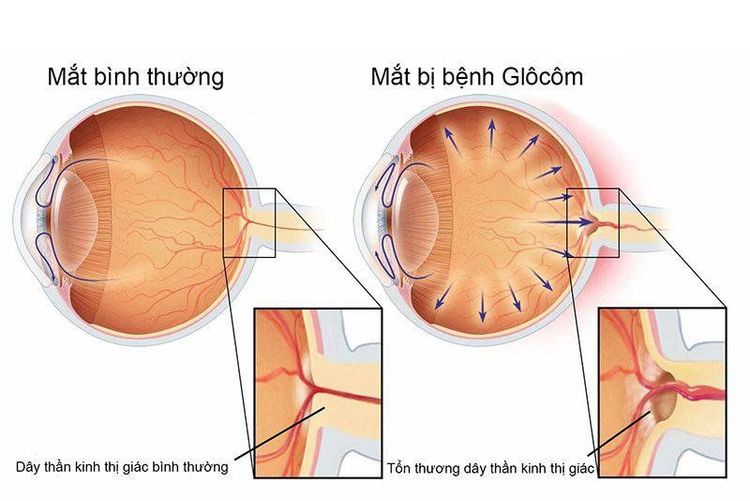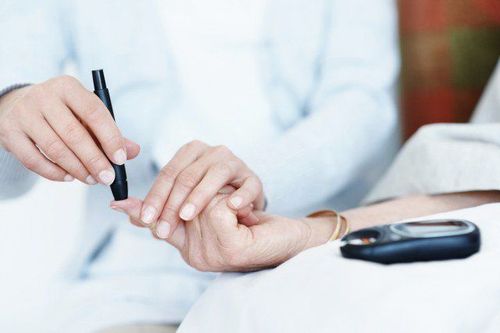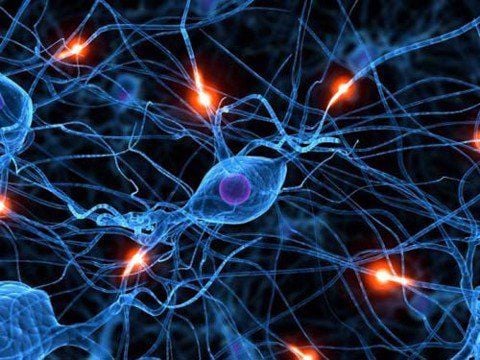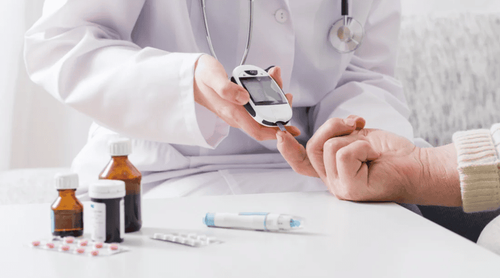This is an automatically translated article.
Diabetes is one of the difficult and dangerous diseases. Microvascular complications caused by diabetes can occur in many different organs such as eyes, kidneys, nervous system... related to high blood sugar levels, which can be prevented if Good control of this sugar.
1. Retinal eye problems – common diabetic microvascular complication
Retinal eye disease is a complication of diabetes that is common in many patients and is the leading cause of blindness in these patients. The mechanism of complications is that the blood vessels of the retina (the light-sensitive tissue area behind the eye) will be destroyed, causing vision loss, vision loss.
1.1 Symptoms when a patient has complications from diabetic retinopathy When it comes to retinopathy, most people with diabetes don't show clinical symptoms until the damage is already severe, causing The chance of successful treatment is very low.
Usually, when it is advanced, the patient may experience some of the following symptoms:
Seeing dark spots or dark strings in the vision; Blurred vision, impaired color vision; There are dark areas or empty areas when you observe things – phenomena; Vision weakens rapidly. Diabetic retinopathy usually occurs in both eyes.
1.2 Serious complications from diabetic retinopathy Diabetic retinopathy is related to abnormal growth of blood vessels in the retina. Therefore, this complication can lead to more serious consequences on vision such as:
Vitreous hemorrhage; Retinal detachment ; Glaucoma ; Blind.

Tăng nhãn áp là biến chứng mạch máu nhỏ do đái tháo đường
2. Neurological complications due to diabetes
Neuropathy is also a type of microvascular complication caused by diabetes, often presenting differently between different patients. In particular, autonomic neuropathy and peripheral neuropathy are the two most common types of diabetic neuropathy. Accordingly, these complications occur in about 50% of patients with type diabetes. In addition, there are also some other types of neurological complications such as muscle atrophy, cranial nerve palsy... but are rare.
Classification of diabetic neuropathy
2.1 Digestive system Autonomic neuropathy: relatively difficult to recognize because the symptoms are similar to common digestive disorders, including: slow digestion, flatulence, nausea and vomiting, heartburn, hot pain in the epigastrium... Lower gastrointestinal nerve complications: causing diarrhea or constipation. In general, gastrointestinal complications due to diabetes are quite dangerous and varied, patients can even have diabetic gastroparesis.
2.2 Urogenital - Genitourinary system Neurological complications in the urinary - genitourinary system have the ability to increase or decrease bladder activity and cause nervous system disorders, including:
For men: Erectile dysfunction, impotence. For women: amenorrhea or menstrual irregularity, decreased sensation in the groin and sexual arousal, vaginal dryness. 2.3 Vasomotor complications of diabetes on the vasomotor nerve can cause increased sweating in the face and body, especially during night sweats or during exercise. In some other cases, this complication can cause decreased sweating, leading to dry itchy skin, hair loss, scaly skin and cracked, calloused feet,...

Đổ nhiều mồ hôi là biến chứng của đái tháo đường lên thần kinh vận mạch
2.4 Peripheral nerve complications When experiencing this complication, the patient may experience the following symptoms:
Heat sensation and external touch sensation may be impaired or completely lost; Fingers and toes feel numb or burning; There is loss of sensation in the arms and legs; Legs, arms and abdomen often have persistent, dull pain or severe pain at night.
3. Microvascular complications from diabetes can cause kidney problems
Diabetes is the leading cause of kidney failure. It is estimated that about one-third of people with diabetes will develop kidney complications.
Doctors explain: this is because diabetics tend to have chronic medical conditions such as high blood pressure, high cholesterol, and vascular disease (such as atherosclerosis). Diabetics are also at increased risk for kidney problems, such as bladder infections or bladder nerve damage.
When kidney damage becomes severe, the function of the kidneys will be limited and so wastes are not filtered out. When that happens, waste will accumulate in the body and reach toxic levels (uremia).
Symptoms of kidney complications due to diabetes
This complication often has no early manifestations, but only symptoms appear when kidney function is impaired, including:
Swelling of hands, feet and face; Loss of concentration, trouble sleeping, eating poorly; Nausea, vomiting; Dry itchy skin (end stage kidney disease); persistent drowsiness, irregular heartbeat due to hyperkalemia; Muscle twitch...

Buồn ngủ liên tục là triệu chứng của biến chứng đái tháo đường lên thận
Microvascular complications caused by diabetes are mostly serious. To prevent these complications from progressing quickly, each patient must consciously adjust their daily activities and diet to suit diabetes.
To prevent complications of diabetes, you should control your blood sugar well. In some cases, the disease is discovered late, until the body shows obvious complications of diabetes. Therefore, you should check your blood sugar at home regularly. Infected patients need to be proactive and regularly re-examined.
Currently, Vinmec International General Hospital is providing a Diabetes Screening Package to help patients detect the disease early and improve treatment efficiency.
With this package, patients will receive:
Endocrine CK Exam (by appointment) Oral Tolerance Test (for customers with suspicious fasting blood sugar results) Glucose Measurement HbA1c Measurement Acidity Uric Determination of Cholesterol Determination of HDL-C (High density lipoprotein Cholesterol) Determination of LDL-C (Low density lipoprotein Cholesterol) Determination of Triglycerides Determination of Urea Determination of Creatinine Measurement of AST Activity (GOT) Measurement of ALT Activity (GPT) GGT (Gama Glutamyl Transferase) activity
Please dial HOTLINE for more information or register for an appointment HERE. Download MyVinmec app to make appointments faster and to manage your bookings easily.
Reference sources: mayoclinic.org, webmd.com












